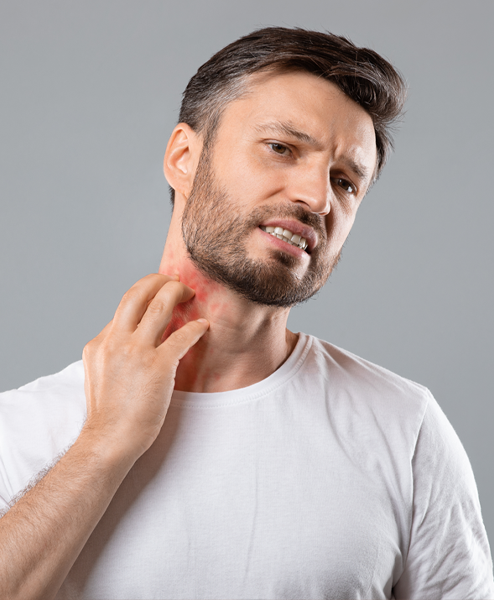When should I suspect psoriasis?
Psoriasis appears as raised red rashes and silvery thick sheaths of skin — known as plaques. Dry, cracking skin that itches and burns as well as nails that separate from the nail bed are additional indicators of psoriasis. In children and young adults, psoriasis may look like small, red spots.
Where does psoriasis show up?
Most commonly, psoriasis appears on the knees, elbows, and torso. But, the condition can really show up anywhere on the body, including your hands, face, and genitals. Because each of these areas has a different level of sensitivity, Dr. Shabazz takes into account where your psoriasis occurs to determine treatment. Achy, stiff joints accompanied by the skin symptoms may indicate psoriatic arthritis, so be sure to mention such complications to Dr. Shabazz.
How is psoriasis systemic?
Often psoriasis shows up in conjunction with other health issues, including psoriatic arthritis, Type 2 diabetes, and cardiovascular disease. Call the office today for a consultation about your psoriasis.
What can I do about the “itch?”
Psoriasis often causes uncomfortable itching and burning that seriously interferes with quality of life. Dr. Shabazz offers ways to manage this symptom, including topical and oral drug therapies, such as antihistamines and steroids. Between treatments, keeping your skin moisturized and showering in cool or cold water also helps alleviate the itching — dry skin and hot water aggravates it.
Can psoriasis be cured?
Unfortunately, psoriasis is a condition that can be managed, but no existing medical treatment cures it. Dr. Shabazz evaluates the impact of psoriasis on your quality of life and the extent to which your skin is affected. She’ll then create a treatment plan with you that might include topical creams, oral medications, and phototherapy. Dr. Shabazz also considers treating your immune system with biologics therapy to get at the source of the psoriasis, rather than just treat the skin symptoms.















